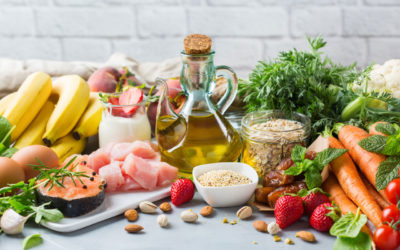
By Charlyn Fargo
For those of us spending more time at home, the refrigerator may be a little too accessible, making it easier to snack a little more often.
Whether we’re working from home or not, what we put into our bodies counts. And the little steps we take – or don’t take – toward healthy eating add up to a journey.
To encourage all of us to take better steps, here’s another reason to turn to fruits and vegetables instead of another chocolate chip cookie or a handful of potato chips. With the fruits and vegetables, you’re adding good nutrients called flavonols.
A new study finds that people who eat or drink more foods with flavonols (an antioxidant found in nearly all fruits, vegetables and tea) may be less likely to develop Alzheimer’s dementia years later. The study was published in the journal Neurology.
So, along with doing that jigsaw puzzle or word search to keep your brain active, consider what you’re eating.
Dr. Thomas Holland, lead researcher at Rush University in Chicago, summarizes that eating more fruits and vegetables and drinking more tea could be an easy way for people to stave off Alzheimer’s dementia. The study involved 921 people with an average age of 81 who had not been diagnosed with Alzheimer’s. The people filled out questionnaires each year on how often they ate certain foods as well as time spent doing other activities. Participants were tested yearly for six years to see whether they had developed Alzheimer’s. Participants were divided into five groups based on how much flavonol they consumed.
The average flavonol intake among American adults is 16 to 20 milligrams per day. In the study, flavonol intake ranged from 5.3 milligrams per day to 15.3 milligrams per day.
The study found those in the highest group were 48% less likely to develop Alzheimer’s than those in the lower group.
The bottom line? While the study doesn’t prove that flavonols directly cause a reduction in disease risk, there’s an association between more fruits and vegetables and less Alzheimer’s risk. That’s enough to convince me to pass on the chips and cookies for more broccoli, Brussels sprouts and beans. And another glass of tea.
Kicking the Sugar Habit
Most of us – despite being around our kitchens more due to this COVID-19 seclusion – are all about trying to break the sugar habit. It’s not that sugar is banned from a healthy diet; it’s just that it’s easy to overdo sugar consumption.
One of the problems is that sugar wears many disguises on a food label. It can be called honey, coconut sugar, brown sugar, corn syrup, agave, brown rice syrup or maple syrup. Sugar is added to 68% of packaged foods and drinks in the U.S. Being mindful of products that contain sugar – and how that sugar is labeled – is a way to begin reducing your sugar.
Sugar can be in plant-based milks, nut butters, bacon, ketchup and even chicken stock. Naturally occurring sugars in fruit, veggies and even milk typically don’t need to be on your worry list, as they come bundled with nutrients, fiber, vitamins and antioxidants.
It’s the added sugars that are a problem. The U.S. Department of Agriculture recommends limiting added sugars to 10% of your daily calories. For a 1,600-calorie diet, that means no more than 160 calories, or 10 teaspoons from added sugars per day. The American Heart Association recommends even less – 100 calories from added sugar, or 6 teaspoons a day.
How to break the sugar habit?
- Read ingredient lists, and choose low-sugar options.
- Reduce your stress. I know it’s hard in times like these, but a workout, walk, hobby or other diversion will be much more helpful than a sugary snack.
- Get enough sleep. We make much better – and healthier – choices when we’re properly rested.
- Reduce sugar in baked goods by adding overripe bananas, applesauce or dates instead of sugar.
- Rather than cutting the acid in a tomato sauce with sugar, try adding grated carrots, butternut squash or sweet potatoes.
- Replace the sweets in your diet with fruit.
- Toss fresh or dried fruit into your oatmeal to replace some of the sugar.
Charlyn Fargo is a registered dietitian at Hy-Vee in Springfield, Illinois, and the media representative for the Illinois Academy of Nutrition and Dietetics. For comments or questions, contact her at charfarg@aol.com or follow her on Twitter @NutritionRD.









